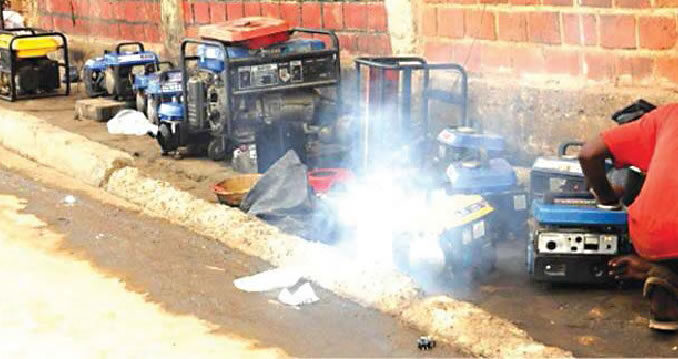
Regular electricity has continued to be a mirage for many Nigerian homes. JANET OGUNDEPO writes on how alternative power supply has increased deaths and contributed to the fast-depleting climatic and environmental conditions in the country
A few days after a businessman, Lawerence Olorungbo, his wife and three children, moved into their newly rented apartment in the Apapa area of Lagos State, the stench of their decomposing bodies greeted their neighbours.
Since the Olorungbos were new to the environment, they had yet to establish a close relationship with neighbours. When some people did not see them for days, they felt the newcomers were yet to fully move in. Until pervasive smell assaulted the area and led residents to the apartment did they discover that their yet-to-be neighbours had died.
Speaking to our correspondent, Olorungbo’s relative, Joseph Olorungbo, stated that he got wind of the incident through a phone call from neighbours one morning in March 2022.
He said the neighbours told him of their intention to call the Apapa Police Station to gain entrance into the building.
Joseph said, “Preliminary investigations showed that the change-over switch was at the generator’s side. The generator was a small one and was found plugged. The fuel tank was also empty. The generator was inside the house and the windows were closed, so there was no way for carbon monoxide to escape. As a layman, we concluded that they died of generator fume inhalation.”
He recalled a previous experience he had with some church members who died of the same circumstance during a church service.
“They were having a vigil; the generator was turned on but placed inside the church and several persons died in the event,” he added.
Olorungbo’s relative stated that immediately he returned home, after settling matters with the police regarding an autopsy, “I told my neighbours to remove their generator sets far away from my space and by God’s grace, they complied.”
Since constant electricity supply had yet to be achieved, the incident made Joseph a crusader of “generator safety and ethics.”
“To be safe, I’ll advise that instead of the small generators owned by individuals, some people can contribute to buy a bigger generator that will serve many people; that way, they won’t fall prey to death by generator smoke inhalation.
“People should take precautions to ensure the generators are in a ventilated area and far away from the house,” he added.
Uncured epileptic power
Nigeria’s electric energy is derived from hydropower or hydroelectric and thermal or fossil fuel power plants.
Hydropower is a renewable, clean, non-fossil fuel form of electricity generation from stored and regulated rivers or dams.
According to Statista, in 2020, electricity was generated more from the thermal plants, 22 terawatts hours, while production from hydropower was 6.1 terawatts hours.
According to the United Nations Framework Convention on Climate Change, about 25 million Nigerians are not connected to the power grid.
The World Bank, corroborating UNFCC’s report, stated that over 80 million Nigerians, which formed 43 per cent of the population, do not have access to grid electricity.
Also, a breakdown of the reports by Climate Score Card stated that in 2018, only 56.5 per cent of Nigerians had access to electricity due to the poor public infrastructure in rural areas, among others.
Unarguably, these data reflect inadequate national power distribution and supply.
In another vein, the International Gas Union, in partnership with Hawilti Limited, in its February 2023 report, stated that the available energy in Nigeria, Cameroon and Egypt, among other African countries, was expensive, inefficient, polluting and unreliable.
Between January and September 2022, the Nigerian national grid collapsed four times.
Deadly generator fumes
Not a year goes by without reports of deaths caused by generator fumes.
In June 2019, the deadly fume cut short the lives of 10 wedding guests, who attended the traditional ceremony of their beloved in Imo State.
The PUNCH reported that the small generator set, popularly known as “I better pass my neighbour” was turned on overnight and kept in a kitchen, while the doors and windows were closed.
Instead of joyous greetings to celebrate the success of the previous day’s celebration, nervous screams and shouts for the guests to open the door were heard.
After a forceful entrance into the house, 10 of the 50 guests were found dead while the others were rushed to a hospital unconscious.
The village head, Martin Ezurike, expressed shock over the incident.
“I know that it was not a case of food poisoning, but fumes from the generator killed them; this is shocking. The parents of the lady, who got married, were among those who survived. Among the dead were the bride’s twin siblings,” he stated.